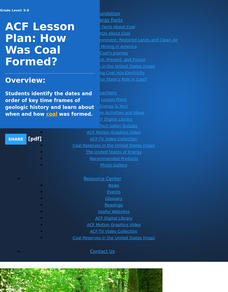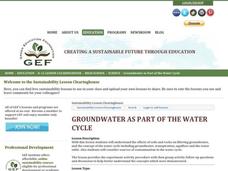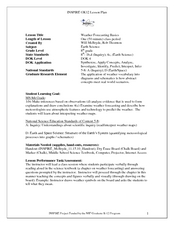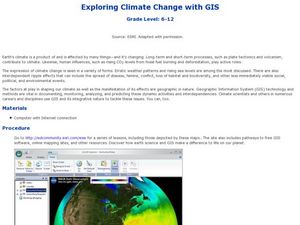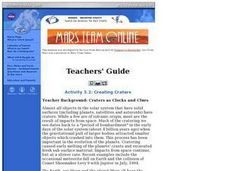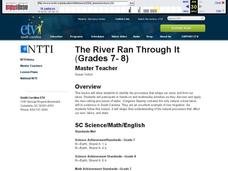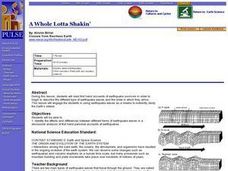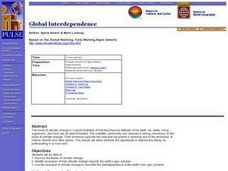Curated OER
How Was Coal Formed?
Geology can be a lot of fun. Learners review geology related vocabulary, make flashcards, use encyclopedias to answer questions, then explore the formation of coal. They identify dates and order them into key time frames of geologic...
Curated OER
Groundwater as Part of the Water Cycle
Make sure to read through the activity procedures thoroughly before teaching this lesson because the materials list is incomplete. Also, the mentioned worksheets and booklet are not available. However, there is no need to discard this...
NOAA
Lost City Chemistry Detectives
In 1977, scientists discovered hot springs in the middle of deep, cold ocean waters near the Galapagos Islands. Scholars research the chemical reactions that explain what scientists found at the Lost City. A discussion connects many...
Forest Foundation
Forests, Carbon & Our Climate
To conclude their examination of forest ecosystems, class members consider the role forests play in the carbon cycle and how forests can offset climate change.
K-State Research and Extensions
Water
How are maps like fish? They both have scales. The chapter includes six different activities at three different levels. Scholars complete activities using natural resources, learn how to read a map, see how to make a compass rosette,...
NASA
Things Are Not Always What They Seem
Science is magic that works. Magical color-changing beads and a coffee can that follows voice commands are just two examples of magic tricks that rely on science. After completing a hands-on activity and an experiment investigating the...
Curated OER
Global Warming – More or Less
Eighth graders identify the factors that contribute to global warming. In this earth science lesson, 8th graders evaluate the impact of global warming on the planet. They discuss their views within the group.
Curated OER
The Water Cycle and Watershed
Pupils summarize the steps in the water cycle. In this earth science instructional activity, students create a skit, song or poem showing the various components of the cycle. They identify the different watersheds in their area.
Curated OER
Weather Forecasting Basics
Eighth graders analyze weather diagrams and weather maps. In this earth science lesson, 8th graders explain why it is important to know the weather. They complete a handout at the end of the lesson.
Curated OER
Exploring Climate Change with GIS
Students investigate climatological changes that are occurring to the Earth. In this climate change lesson plan, students access an assigned web site to view maps and lessons that show how climate change makes a difference to life on Earth.
Curated OER
Soil Layers
Ninth graders identify the different layers of soil. In this earth science lesson, 9th graders explain how limestone layers are formed. They identify the different parts of the coral colony.
Curated OER
Rock Cycle
Students explain the processes involved in the rock cycle. In this earth science lesson, students identify the different kinds of rocks. They complete a worksheet during the activity.
Curated OER
LONGSHORE EROSION
Students research the concept of the erosional effects of the longshore current. The use of a demonstration is used to illustrate the physical process of erosion. Students remain engaged in the lesson plan with the use of this multiple...
Curated OER
Glaciers
Seventh graders summarize how Earth processes today are similar to
those that occurred in the past. They read excerpts from John Muir's "Yosemite Glaciers" and explain how slow geologic processes have large cumulative effects over long...
Curated OER
Creating Craters
Young scholars explore parts of an impact crater and compare and contrast craters found in Earth, the Moon, and Mars. Crater formation is modelled and the relationship of mass, velocity, and size of the projectile to the crater formation...
Curated OER
The River Ran Through It
Young scholars identify the processes that shape our rivers and form our lakes. They participate in hands-on and multimedia activities as they discover and apply the river-cutting processes of water.
Curated OER
It's Going to Blow Up!
Young scholars discover the major characteristics of volcanoes on the Pacific Ring of Fire. They describe the processes that produce the "Submarine Ring of Fire." students explain the factors that contribute to explosive volcanic eruptions.
Curated OER
A Whole Lotta Shakin'
Students read first hand accounts of earthquake survivors in order to begin the describe the different types of earthquake waves and the order in which they arrive. They engage in using earthquake waves as a means to indirectly study the...
Curated OER
World Geography: Global Interdependence
Students are able to discuss the theory of climate change. They identify examples of how climate change impacts the earth's geo-spheres. Students are able to use the example of climate change to describe the interdependence of the...
Curated OER
Friendly Volcanoes
Students discuss the benefits of volcanic activity on marine life. They explain the process of tectonic plates.
Curated OER
Recycle Lifecycle
Students investigate the recycling process. In this recycling activity, students read the article The Recycling Process After Collection and discuss the advantages of recycling. As an extension activity, students simulate the molding of...
Curated OER
Study of Fossils
Fifth graders dig for fossils. In this fossil lesson, 5th graders read about the oldest found fossils and discuss the process of fossilization. They dig for their own fossils in a fossil box made of several dirt layers.
Curated OER
Evaporation
Fourth graders study the water cycle and the different processes involved, specifically evaporation. They explore the processes of evaporation through hands-on collaborative activities and relate learning to life through...
Curated OER
Weathering Agent 007
Students are introduced to the concept of weathering. In groups, they use the internet to research the various types of weathering agents and their effect on different materials. Using photographs, they discuss the role humans play in...


